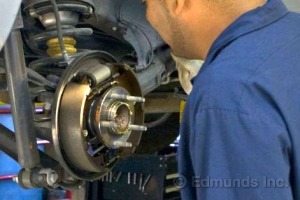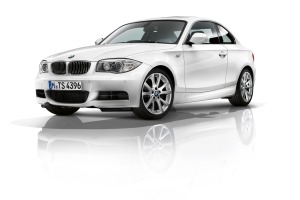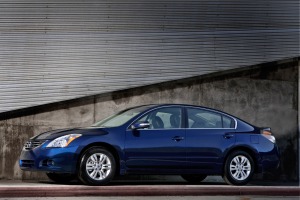
Once you have received a "yes" commitment from a customer, it's easier to continue the positive pattern of continued "yeses." The customer finds it hard to break the affirmative sequence. You then will have the opportunity to Upsell them. — The Art of Upselling
Becoming a victim of the upsell is like getting paper cuts — receive enough of them and you'll bleed to death. Upselling is simply the salesperson's process of tacking on an extra item or upgrading your initial purchase to a higher level that costs you more. Upselling certainly isn't unique to the automotive realm, but it has become a fine art in car dealerships, tire stores, repair shops and even car washes.
Often, it's like a sucker punch you never saw coming, an innocent question like, "Of course, you want to protect your purchase with the extended warranty. So do you want the platinum, gold or bronze package?" To illustrate the upsell in action, we went to a quick oil change outlet and secretly recorded the conversation with the salesman. Not only did we get three upsell pitches, but one was an outright fraud.
All-American Upselling
The classic upsell is in the fast food arena. If you order just a hamburger, you are immediately offered a "meal," a combination of burger, fries and drink at a higher price. Then you are offered a larger size. And finally, you are offered cheese, avocado or other additions, without realizing they all cost more money.
In this case, the customer has been "bumped" from a $3 hamburger to a $5 meal, upgraded to a larger size at $6 and then had a 20-cent slice of cheese added. Meanwhile, the hungry customer has hardly even noticed that he just had his pocket picked.
Language of the Upsell
Salespeople are instructed to upsell using "assumptive" questions. This is subtly woven into the conversation to persuade and trap unaware consumers into a quick sale. "You want your car to look sharp, so the best way to do that is with our paint protection package," the finance manager says. "At only $7 more a month it's a total no-brainer."
There can also be a strong element of coercion involved in the sales pitches: "This is the plan most customers choose because it's a dynamite value."
You can usually feel an upsell coming when the salesman begins describing a perceived benefit or convenience. "While we're installing your new tires, it's a great time to get the brake pads changed. Would you like us to take care of that today?"
A Real-Life Scenario
We drove into a quick oil change store with a hidden recorder to capture the upsell in action. The attendant greeted us and immediately had another worker drive the car into the service bay.
Upsell #1: The attendant quoted the price as $37.99 (before taxes and a $2 disposal fee). He then pitched several upgrades to more expensive oils by calling them "high mileage" and concluding by saying, "synthetic is the best." He did not list the price, even though the cost was nearly double.
Upsell #2: "Did you know you have a brake light out," the attendant said as soon as our car was out of sight in the service bay. "We can take care of that for you today." We had to ask for the price, which was $9.99 but came with a "lifetime guarantee." As it turned out, the brake light was not burned out so this upsell was also a complete fraud. The price of two brake light bulbs at the local auto parts store was $3.99.
Upsell #3: The attendant offered to replace our air filter, which was not dirty. Again, no mention of price until we requested it. It was $16.99, which turned out to be the same as an air filter from Pep Boys.
Upsell #4: When our order was rung up at the register, a new attendant again offered to replace the air filter, saying, "It's for better mileage."
If we had accepted all the items offered (synthetic oil, brake light and air filter) our intended $37.99 purchase would have been $106.97.
Stores That Upsell and What They Offer
The upsell abounds in all types of stores and sales situations. But in the automotive arena, upselling is particularly active in these locations for these products.
When buying a new car — In the finance and insurance office, the F&I manager will certainly pitch the extended warranty but may also try to sell additional alarm systems, paint and fabric protection, maintenance plans and other anti-theft devices.
Dealership service department — Go in for a simple oil change and any host of services will be pushed on you. The classic approach here is to present the "dealer recommended" list of services, which is far more costly than what your owner's manual calls for.
Tire stores — You go in to buy a new set of tires and they will also try to sell you tire warranties, brake jobs, shock absorbers and wheel alignments.
Quick oil change stores — As you have seen, the classic upsell is an air filter. But another popular item pushed here is an automatic transmission flush and fluid replacement. Brake jobs are also popular, along with synthetic oils.
Defense Against the Upsell
Here are four quick ways to fend off eager salespeople and keep your money in your pocket:
Know the upsell is coming — This helps you to be on your toes and not reflexively agree to unnecessary purchases. Our impulse is to be agreeable, but when being offered products, consider their real value before accepting them. Often, these things can be purchased elsewhere at a lower price.
Resist assumptions — The assumptive question is a sneaky way to coerce you into buying things. Recognize this gambit, smile and reject it with a polite, "No, thanks."
No guilt trips, please — Many people are susceptible to the offers that imply you are negligent for not taking the higher-grade oil or the longer warranty. It helps to remember that the salesperson's high opinion of this service is because it will make him or her a lot more money.
Be ready for follow-up pitches — Just because you said no once doesn't mean they won't try again. You can always fall back on your own vague responses such as "I'm not interested at this time." Then, you aren't trying to reject their claims, only saying that you don't want it now.
Upselling: The Big Picture
Recognizing the art of the upsell is not only vital to protecting your money, it also focuses you on what you really need. You came in to buy one product because you needed it, but now the sales team thinks you're a sitting duck for add-ons and upgrades. Show the salespeople you know your own mind and don't fall for their pitches. Over the years, these small savings will turn into a mountain of cash.









